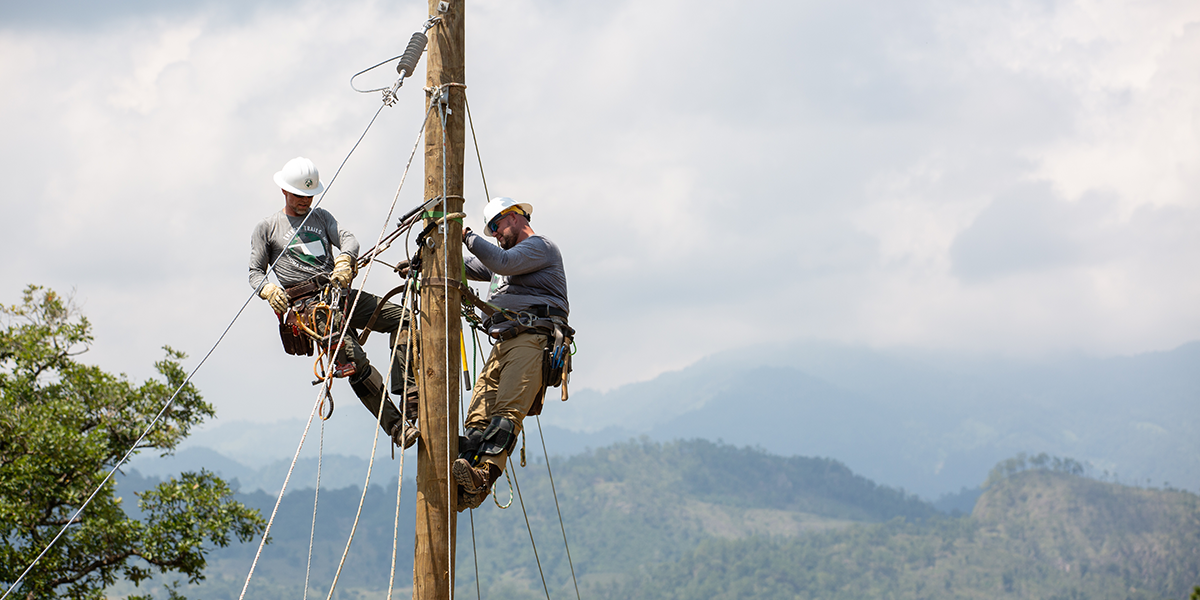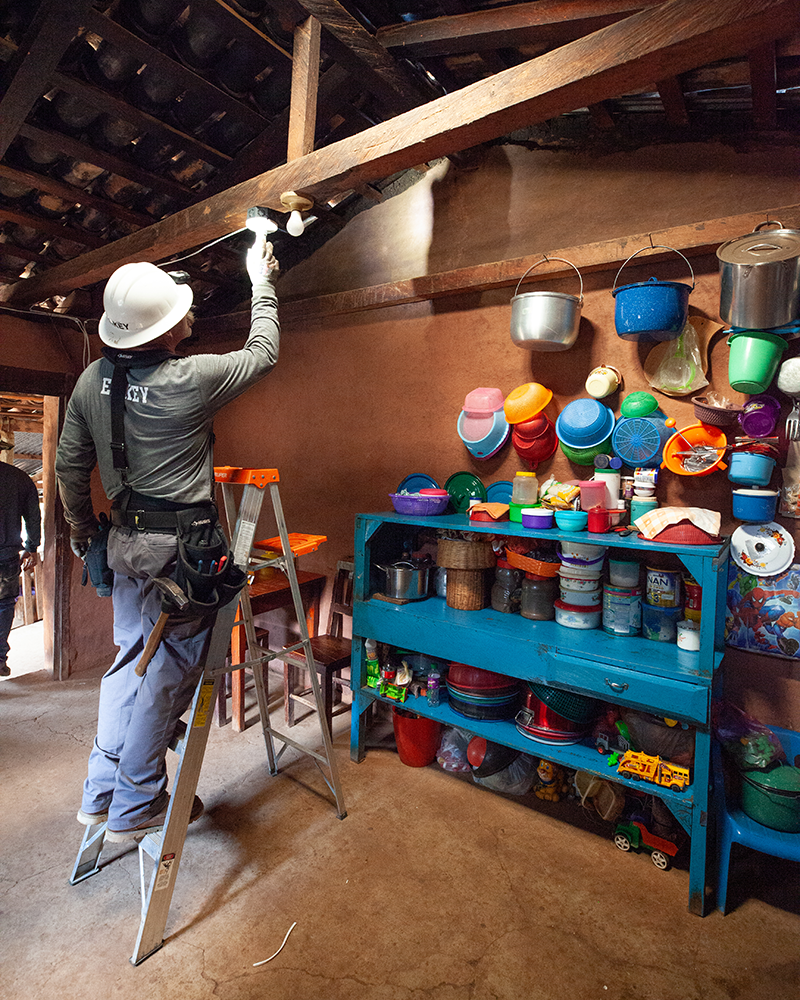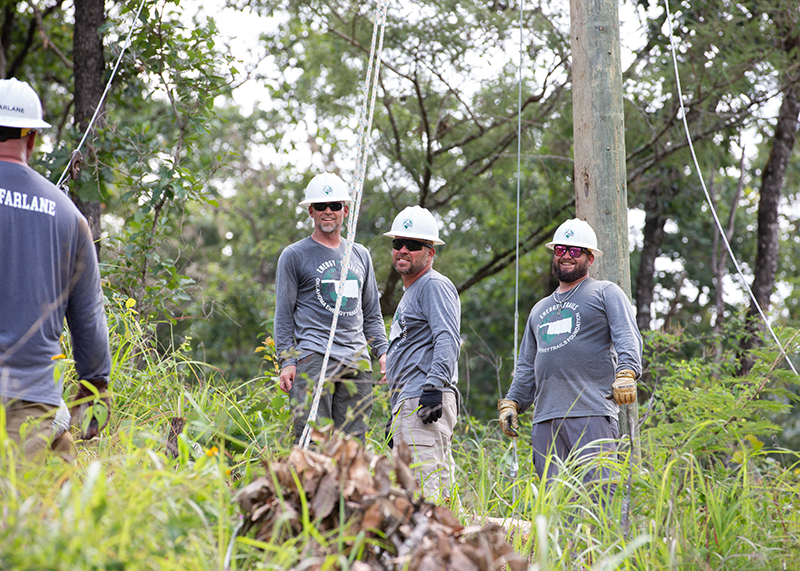Oklahoma Co-ops Help Guatemalan Village

It Starts with Power: Oklahoma Co-ops Help Guatemalan Village
Last October, 15 volunteer line workers from nine Oklahoma electric cooperatives spent three weeks in Guatemala working to bring first-time electricity to the rural village of Barejones. Launched during National Co-op Month, the project was coordinated by the Oklahoma Association of Electric Cooperatives (OAEC) and NRECA International. CFC and NCSC were proud to support the mission with $70,000 in grants.
This was OAEC’s seventh international electrification project since 2016, with Sooner teams previously working in Bolivia and Guatemala. Collectively, nearly 1,000 first-time connections to electricity have been made possible through these missions.
“Anytime we have the opportunity to pay it forward, we should,” OAEC Director of Public Relations & Communications Anna Politano said. “Investing in international electrification takes us back to our roots. We enjoy the quality of life we have today because others paved the way for us. It is an immense privilege to invest in the gift of light—it impacts generations to come. The mission continues until everyone, in every nation, has electric power.”
This project was the first of a two-phase mission that was completed by Ohio line workers in January.
“The village of Barejones has a unique layout,” Politano explained. “It has a lower part with fewer homes that are more spread out and an upper part with a more concentrated number of homes. The two parts are connected by a river and a hill that leads to the upper part. Oklahoma was responsible for electrifying the lower part of the village and for building powerlines through the connecting hill to the elementary school on the upper part of the village. Electrification for the upper part of the village was completed by Ohio’s electric cooperatives.”
 A line worker installing lighting in Barejones.
A line worker installing lighting in Barejones.
Not An Easy Project
When the Oklahoma line workers arrived in the village, located in a rural region east of Guatemala City, they set to work, but the project was not an easy one.
“The lack of equipment and tools they are used to having in the United States is always a challenge for the line workers,” Politano said. “That makes the work much more manual and labor intensive. The mountainous terrain was also more challenging than what they’re used to in Oklahoma, which is mostly flat. Fortunately, the weather was mild and that helped the team.”
The villagers helped by setting the poles and digging and setting the anchors. They also helped move the project along by pulling all the primary and secondary wire.
“The villagers were extremely hard-working, kind, resilient and generous,” Politano said. “The Oklahoma line workers were humbled and grateful for the experience.”
Each line worker said they would go back again in a heartbeat. They loved the brotherhood they formed as well as the friendships they made with the local villagers and kids.
“It was hard work. I knew to expect that, but what I didn’t know was what I’d take away from the trip,” Duncan Nelson, from Indian Electric Cooperative, said. “It was an experience of a lifetime. It’s amazing to see how the people there get on with their lives without a lot of resources and they are just as happy, if not happier, than people who have everything. It puts a lot into perspective.”
“What I took away from the experience was the camaraderie between the linemen and the villagers,” Jon Enkey, from Lake Region Electric Cooperative, said. “We’re from different parts of the world and speak different languages, but in the end, we’re the same. We all want to provide for our families. For them, success is being able to live and thrive in their village, now with electricity.”
Reliable Electricity Enhances Quality of Life
Over the course of nearly three weeks, the team installed five miles of primary and secondary line across 51 poles, hung three transformers and wired 19 homes and two elementary schools for power. At the end, a lighting ceremony was held at the school to thank the volunteers for their work.
Reliable electricity will improve quality of life in the village by enabling the use of electric lighting, cooking, refrigeration and electric appliances. Electricity is also cheaper than other energy sources and will help drive economic growth.
“Access to electricity will be extremely beneficial to the residents of Barejones,” Politano said. “Elder Cisneros, the teacher at the main elementary school in the village, told us that without electricity, he had limited resources to enrich the children’s education. But with electricity, he was looking forward to having more resources, including computers, to enhance student learning.”
 The Oklahoma crew are all smiles as they take a quick breather.
The Oklahoma crew are all smiles as they take a quick breather.
Positive Member Feedback
OAEC has received a lot of positive feedback from members on their participation in the international program.
“Our cooperative family in Oklahoma is very supportive of these missions,” Politano said. “We have heard from members across the state who are grateful and proud that our co-ops are investing in projects like this and making a difference in the lives of others. They know it creates a great impact both on the line workers and on the villagers.”
“The CFC and NCSC grants are incredibly beneficial and deeply appreciated,” Politano added. “They help us cover the costs of sponsoring the project from buying materials and equipment, to lodging, food and transportation for the volunteers.”
OAEC already has another international mission scheduled for 2026.
“It is an honor for Oklahoma’s electric cooperatives to do a small part in helping far-away communities enjoy the gift of electricity,” Politano said. “We believe it starts with power and it starts with us. We are grateful to our partners for making these opportunities available to our co-ops.”